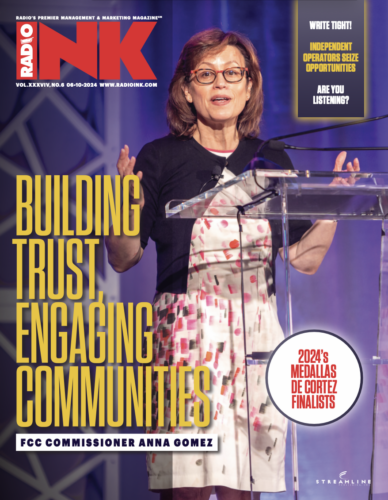
In NAB CEO Curtis LeGeyt’s opening statement during the “100 Years of Inequity for Recording Artists” hearing in the House Judiciary Subcommittee on Courts, Intellectual Property, and the Internet, he cited this Radio Ink op-ed, originally published January 26, 2022. In the spirit of the Local Radio Freedom Act, we again share these thoughts.
(By Amador Bustos) For decades, radio has played an important role in local ethnic communities. Local ethnic radio has kept listeners connected, informed, and entertained with new and traditional music from their region of origin.
It has also served a vital role with lifesaving alerts during times of disaster. As the founder, president, and CEO of Bustos Media, I know how broadcast radio is especially important to minority and underserved communities. Bustos Media is one of the few independent family-owned Hispanic radio groups in the country.
Each week, local AM and FM radio reaches more than 90% of Hispanics in the U.S. In addition to English and Spanish-language formats, Bustos Media stations serve a number of diverse linguistic and ethnic audiences. Our stations also serve the Vietnamese and Korean communities in San Jose, California and Houston Texas. In Portland, Oregon one of our AM stations serves the Russian speaking community. We provide a unique and vital service.
Many of these stations’ audience are non-English speakers and will be underserved by general market media. During the COVID-19 pandemic, during major fires and hurricanes Bustos Media stations have played an outsized role in keeping these listeners safe, informed and healthy.
Unfortunately, recent legislation introduced in Congress would hurt my stations’ ability to provide this and other community services. The American Music Fairness Act (AMFA) would institute a minimum performance royalty of $500 per year on smaller radio stations such as mine. While the bill’s supporters claim this fee is a nominal cost on smaller broadcasters and their real target is the largest radio groups, any additional performance tax or royalty could significantly impact my stations’ already thin margins.
I also know once a tax or royalty is put in place, and codify into law, it rarely decreases or is eliminated. With no cap on a performance royalty, there is a clear danger this $500-per-year could be thousands in a few years.
Broadcast radio, in general and ethnic radio in particular, continues to be a significant driver of music discovery, shining the spotlight on new musicians and helping legacy artists sustain their careers. Yet, under this proposed performance fee, up-and-coming artists would suffer, while the bigger and already well-established artists, and their multinational record labels, would greatly benefit.
To avoid paying higher fees, radio stations would focus their airplay on the most popular performing artists to attempt to draw a larger audience at minimal cost. That is exactly what is happening on streaming platforms, where a recent study, published in Billboard, found nearly half of the 877.2 billion on-demand audio streams in the U.S. in 2020 came from just 0.022% of the titles that were tracked. This is a clear instance where legislation would further slant, instead of leveling, the playing field. Rather than support the entrance of new artists, the AMFA proposal would only help the rich get richer.
Instituting a performance tax or fee on local radio stations would also compound the current challenging economic climate facing broadcasters. We are still recovering from the toll of the pandemic, which wreaked havoc on local and national advertising. At the start of the pandemic our company lost 65% of its revenues in a matter of eight weeks. On a more macro level, a recent analysis, published by the MediaDailyNews, found that traditional media outlets – including local radio, TV and print – lost over $15 billion in advertising dollars over the first 13 months of the pandemic.
Now, as we are starting to recover, imposing a new performance tax on radio stations would be the wrong move at the wrong time. Thankfully, there continues to be strong support in Congress for the Local Radio Freedom Act, a resolution opposing an additional performance tax on over the air radio broadcasters. Over 225 members of the House of Representatives and Senate have expressed their support for local radio by signing on as co-sponsors of the resolution.
I want to thank these members of Congress for standing beside broadcasters and, supporting this “old” media, as we strive to continue providing an important service to ethnic communities across the country, in the face of ever-growing competitive pressure from “new” media outlets.
Amador Bustos is President of Bustos Media and can be reached by e-mail at [email protected]






This tax or “fee” could also illustrate the law of unintended consequences, at least as far as ethnic radio is concerned. If this abomination is enacted and the ethnic stations are driven out of business, watch for an explosion in pirate radio in cities that have large immigrant populations. Pirates, of course, pay no fees to ASCAP, BMI, SESAC, or the FCC. They just broadcast until the FCC catches them and takes them off the air. In New York City, most of the pirates are ethnic. They broadcast in Spanish, Russian, Haitian Creole, or Caribbean accented English.
How many of you remember the time when record labels PAID stations or disc jockeys to add songs? Or is the payola scandal too distant of a memory?